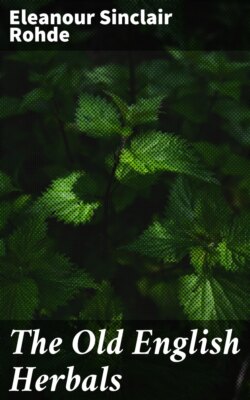Читать книгу The Old English Herbals - Eleanour Sinclair Rohde - Страница 3
На сайте Литреса книга снята с продажи.
PREFACE
ОглавлениеTable of Contents
The writing of this book on that fascinating and somewhat neglected[1] branch of garden literature—the old English Herbals—has been a labour of love, but it could not have been done without all the kind help I have had. My grateful thanks are due to the authorities at the British Museum, to Professor Burkitt of Cambridge, and very specially to Mr. J. B. Capper for invaluable help. I am indebted to Dr. James, the Provost of Eton, for his kind permission to reproduce an illustration from a twelfth-century MS. in the Library of Eton College for the frontispiece. I find it difficult to express either my indebtedness or my gratitude to Dr. and Mrs. Charles Singer, the former for all his help and the latter for her generous permission to make use of her valuable bibliography of early scientific manuscripts. I am further indebted to Dr. Charles Singer for reading the chapter on the Anglo-Saxon herbals in proof. For their kind courtesy in answering my inquiries concerning the MS. herbals in the libraries of their respective cathedrals, I offer my grateful thanks to the Deans of Lincoln and Gloucester Cathedrals, and to the Rev. J. N. Needham for information concerning the herbals in the library of Durham Cathedral; to the librarians of the following colleges—All Souls’ College, Oxford; Balliol College, Oxford; Corpus Christi College, Oxford; Corpus Christi College, Cambridge; Emmanuel College, Cambridge; Gonville and Caius College, Cambridge; Magdalene College, Cambridge; Peterhouse, Cambridge; Jesus College, Cambridge; St. John’s College, Oxford, and Trinity College, Cambridge; to the librarians of Durham University, Trinity College, Dublin, the Royal Irish Academy, and the National Library of Wales; to the Honble. Lady Cecil for information respecting MSS. in the library of the late Lord Amherst of Hackney; and to the following owners of private libraries—the Marquis of Bath, Lord Leconfield, Lord Clifden, Mr. T. Fitzroy Fenwick of Cheltenham, and Mr. Wynne of Peniarth, Merioneth. For information respecting incunabula herbals in American libraries I am indebted to Dr. Arnold Klebs and to Mr. Green of the Missouri Botanical Garden, St. Louis.
No pains have been spared to make the bibliographies as complete as possible, but I should be glad to be told of any errors or omissions. There are certain editions of Banckes’s Herbal and The Grete Herball mentioned by authorities such as Ames, Hazlitt, etc., of which no copies can now be found in the chief British libraries (see p. 204 et seq.). If any copies of these editions are in private libraries I should be grateful to hear of them. The rarest printed herbal is “Arbolayre contenāt la qualitey et vertus proprietiez des herbes gōmes et simēces extraite de plusiers tratiers de medicine com̄ent davicene de rasis de constatin de ysaac et plateaire selon le con̄u usaige bien correct.” (Supposed to have been printed by M. Husz at Lyons.) It is believed that there are only two copies of this book now extant. One is in the Bibliothèque Nationale, Paris; the other was sold in London, March 23, 1898, but I have been unable to discover who is the present owner. For this or any other information I should be most grateful.
Eleanour Sinclair Rohde.
